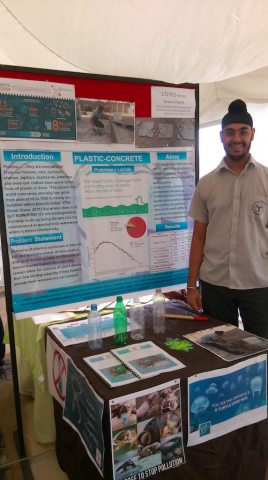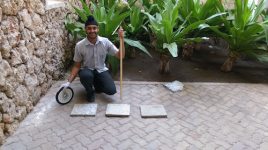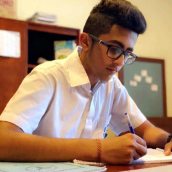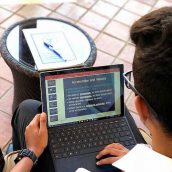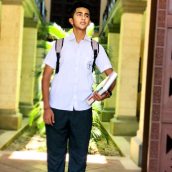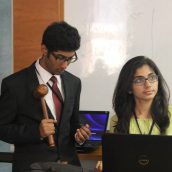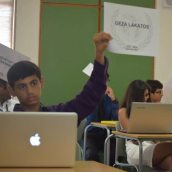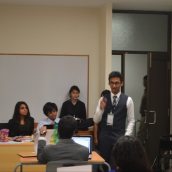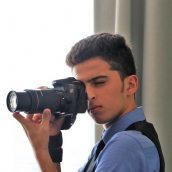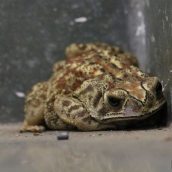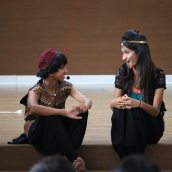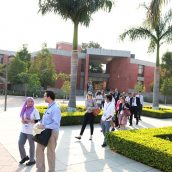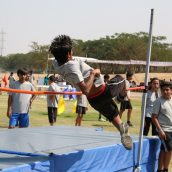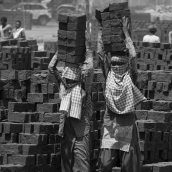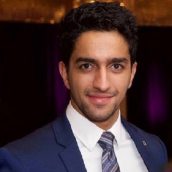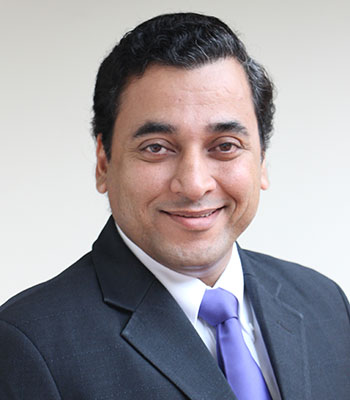Prabhdeep Lochab: Seeking simple solutions to global problems
Being a global citizen, leader and environmental enthusiast is no easy task. Prabhdeep Lochab’s story is a testament to the hard work, dedication and commitment that goes into innovating “green” solutions for a sustainable future.
A second-year Diploma student at the Aga Khan Academy campus in Mombasa, Prabhdeep Lochab was the gold medal recipient at the Golden Climate International Science Fair Olympiad for his “plastic concrete” invention.“I wanted to come up with something unique which was practical and easy to carry out,” Prabhdeep says. For his project, Prabhdeep aimed to alleviate pollution in construction, using plastic in a concrete-mix for construction of infrastructure for non-commercial construction. This concrete could be used to construct walkways, driveways, and parks.
When asked about his motivation to pursue a science project for the fair, Prabhdeep said “I have a personal interest in science and I love inventing and being creative to help find solutions to everyday problems.” The simple yet effective solution Prabhdeep managed to devise exhibits his passion for the sciences, as well as his passion to solve environmental issues on a local and global level.
When reflecting on the process, Prabhdeep claimed that it was very challenging to balance school work and extracurricular activities along with finding time to work on his invention.
“I would come up with a new idea every meeting and it was rejected as being either to simple or relatively complicated to carry out. It was very frustrating but I was committed and I kept on trying,” he says.
He appreciates the meeting time he had during the science club that was offered, as he was able to use that time to discuss his ideas with teachers and create a research plan. “We met once every week on Tuesday to discuss the progress of our ideas and concepts that we wanted to use as our projects. Being a part of this group really pushed me to my limits.”
After much struggle and careful mentoring from his science teachers, Mr Godfrey Kokeyo and Mr Charles Gumba, at the Academy, Prabhdeep’s project progressed to the national level. For Prabhdeep, the experience was already so fulfilling because of the hard work, dedication and commitment that went into creating the project. “I realized what a huge event this was and that it was something big to come as far as I had. I knew that I had achieved something great even if I didn’t win anything,” Prabhdeep shared.
Prabhdeep had the opportunity to represent the Academy and his country, Kenya, at the international level at the Golden Climate International Science Fair Olympiad. His project was shared with various ministers from Kenyan environmental authorities and also in front of a panel of judges, who are all acclaimed scientists in their respective fields. His work was particularly recognized for the detailed lab report, experimentation process and presentation of data using a diverse range of media (graphs, text, etc).
Prabhdeep and his parents were both pleasantly surprised when his project was not only awarded the gold medal in his category, but was also awarded a special prize from the National Environmental Management Authority.
For Prabhdeep, this opportunity was so rewarding as he claims it helped him increase awareness of his personal strengths and helped him grow as an individual.
Through this experience, not only was Prabhdeep able to devise a simple solution to help alleviate pollution, but he was also able to apply skills learned in the classroom at a practical level such as writing lab reports and representing data. His hard work, dedication and commitment to make the world a better place is evident in the accolades his project received at the Golden Climate International Science Fair Olympiad.
By Karishma Bhagani
Saifan Aswani: Helping the environment through reflection and determination
Incredible things happen when you slow down. When you take the time to look, listen, watch and reflect. You see the beauty and apparent simplicity in the world around you.
Saifan Aswani, a student at the Aga Khan Academy Mombasa, knows the value of taking the time to appreciate his surroundings. In fact, he says he is “bonded with nature”, and loves to sketch and photograph natural landscapes. His ambitions would see him taking to the skies in the field of aeronautics, bringing his passion for being in nature to another level.
Saifan’s penchant for reflection has instilled in him tremendous gratitude for his current good fortune to be studying at the Academy. He shares his personal journey of growth since arriving in Mombasa from the Congo: “Before I joined, I used to be a student who didn’t work hard and wasn’t independent. Coming to this Academy has changed a lot for me, not only increasing my knowledge of the concepts taught, but also developing self-respect and respect for others.” He continues, “The Academy doesn't only teach theories, but connects the concept to the real life. Living here makes me learn more about cultures as we have students and dorm parents who come from diverse socio-economic backgrounds.”
When you add all this up – a deep sense of reflection, an appreciation for nature and an education designed to support students to connect with others and improving the world around them – it is no wonder that Saifan has recently won an award for his work in the field of environmental studies.
Taking part in the seventh edition of the Golden Climate International Environmental Project Olympiad and representing Kenya and the Academy, Saifan won a gold medal in the agriculture category for his creation of a desalinisation unit.
Saifan first thought of his project idea in 2017 while contemplating the Indian Ocean which graces the shores of Mombasa near the Aga Khan Academy’s campus – he had slowed down, taking the time to look, watch and reflect. As Saifan explains, the salty water of the Indian Ocean can hinder the growth of plants in the surrounding area. Saifan developed a desalinisation unit as a low-cost, eco-friendly solution to this problem. He hopes it will help the local flora and develop more productive agricultural practices.
Compassionate and motivated, Saifan explains that, “The innovation came up as a result of research and investigating local issues surrounding my environment.” He then designed and built the desalinisation unit himself. In the same way that an artist combines simple shapes into a masterpiece, Saifan imaginatively transformed natural processes into a solution with real life applications: “The innovation consists of basic applications I studied in class: evaporation, condensation and solar energy.”
As the youngest participant from his school, he encountered many challenges in creating his award-winning design. The determined and hard-working Saifan recalls sound advice from his supervisor that helped him to persevere: "He told me, ‘I'm not telling you it’s going to be easy. I'm telling you it’s going to be worth it.’"
Throughout his time at the Academy, Saifan has realised that there was more to education than concepts, numbers and exams. As he says, “We are the leaders of the future.” He credits his experience of the past three years at the Academy for instilling in him the discipline of hard work, an appreciation of diverse cultures and the motivation to pursue this responsibility. As he has learned, “There is no elevator to the floor of success. You have to take the stairs!"
By Asif-Aly Penwala
Rising Beyond: Inspiring Debate at the MUN
The simulation opened with an aesthetic dance performance showcasing culture that exists in great depth, as well as having Birad Yajnik speaking about global citizenship and leadership. The opening ceremony was followed by the first session of this simulation which consisted of students prepared for heavy debate.
The first session was preliminary and introduced the agendas and topics of debate of each committee to all the delegates. DISEC (Disarmament and International Security Committee) was engaged in debating over the international intervention in Civil Wars; ECOSOC (Economic and Social Council) debated over the impact of science, innovation and technology in achieving the millennium development goals; the JCC (Joint Crisis Committee) went back into history and debated over issues concerning World War II; and lastly, we had the Press Corps which interacted with each committee and their delegates of the conference, and got intensely rooted in the simulation, in order to provide for a very holistic experience of the whole event that took place.The second day still carried on with the same passion and enthusiasm. The second session started off with a morning crisis update, which proved to be quite a surprise to all the delegates. However, the debates in each committee over the crisis initiated slowly, and later escalated into deeper and effective discussions. The Press were involved in initiating Crisis in each committee which proved to be operative as it provoked heavy debates and discussions, further on the day. The second day proved to be an ecstatic and progressive one as it stimulated every mind, which resulted in exciting preparations for resolutions for the last day. The Delegate Dance was of course one of the highlights of the second day of the simulation.
Eventually came the final day of the simulation. The day proved to be brief but tense as delegates of each committee had to come up with effective resolutions according to their agendas. Every committee except for JCC (as it was historical) and DISEC succeeded in coming up with resolutions. Although DISEC failed to pass a resolution, it still instilled the sense of intrigue, passion and enthusiasm to overcome problems that are faced on the surface of the planet – each day and every moment.After having come up with a variety of resolutions, the time for closing the simulation had come. This time was much awaited by the delegates as it was also an award ceremony. Titles such as “Best Delegate”, “Outstanding Delegate”, “Best Photographer” and “Best Reporter” echoed the halls of the venue wherein the ceremony took place. After having a hearing of speeches of inspiration and accomplishment by the Security General and the Executive Board, as well as teachers and staff who functioned as a backbone to the simulation; and watching proud delegates walking towards their much deserving awards, came the time of saying a proud goodbye to the Aga Khan Academy, Hyderabad’s second edition of the Model United Nations conference. Now awaits the third edition which shall happen in Fall, 2015.
By Akanksha Dev
Nabil Patel: photographer par excellence and published author
Aleem Mawji (Class of 2012): The most powerful weapon
A Hand Up at the Aga Khan Academy
I was born in Dar es Salaam, Tanzania, where I went through Aga Khan Nursery, Primary and Secondary schools. When I was approaching my last two years of secondary education, I started considering a move away from home to prepare for life in university, and the Aga Khan Academy Mombasa came to mind. I had visited the campus in seventh grade for a soccer tournament, and was left amazed by the beauty of the facility.
To be perfectly frank, my family’s financial circumstances would have made it very difficult to attend the Academy; some form of financial assistance was crucial. I was thrilled when AKA saw past the financial difficulty, recognized my accomplishments and potential to excel, and accepted me with a scholarship. I gratefully accepted the scholarship, knowing I had a responsibility to make full use of this immense opportunity. So at age 16 I set out for Mombasa and started with the International Baccalaureate (IB) program!
Learning a New Mode of Thinking; Meeting a New Community
Every day at AKA was challenging, as anyone that has experience with the IB program can certainly attest! Even mathematics presented a new language; I remember having to read a paper on mathematics with the date of publication and page numbers being the only numbers in the entire document! However, my most valuable academic experience was studying the Theory of Knowledge. This course focused very strongly on making one critically examine what it is that we “know.” To this day it has me questioning a lot of premises I would otherwise accept.
While the academic environment was fairly rigorous, it only enforced the already-strong sense of community one would experience in the residential program. One moment, we were scratching our heads over a physics lab report due that evening, and the next, we were plotting ways to sneak into the AstroTurf to kick the soccer ball around! In my opinion, this type of learning environment truly makes the Academy a unique and fulfilling experience. To this day, I still regard many of my dorm-mates as extended family rather than school colleagues.
Path to British Columbia
At the end of my two-year stay in Mombasa, I was honored to receive the Academy’s Medal of Honor for highest academic standing, and Award of Excellence; an all-round award for academics, sports, extracurricular, leadership, and volunteering. I was also nominated by the Academy for the International Leader of Tomorrow Award from the University of British Columbia (UBC). I received this award in the form of a full scholarship to study the program of my choice at UBC’s campus in Vancouver, Canada. While I left the compound of the Academy with immense joy knowing I had fulfilled some expectations placed on me, I felt an even greater sense of responsibility to myself, my family and the Academy given my opportunity to study in British Columbia.
The program I decided to study was Mechanical Engineering. Coming from a family of engineers certainly played a role in this decision, but I most appreciated the versatility of the degree and how the applications of mechanical engineering design spanned a range of industries. Over the course of my degree, I have worked on projects ranging from micro-controller-based autonomous vehicles, to a drip-irrigation system for optimizing use of a limited water supply. I have also spent eight months in the maintenance engineering department of a large copper mine, and have worked on the design of a device to prevent excessive bleeding from an injured limb.
I attribute my desire to work on this wide range of projects to two things: an unwillingness to be satisfied with the knowledge the I possess at any time, and a desire to have a larger positive impact on as many fronts as I can, when I have the capacity to do so. While these are arguably generic traits, my belief in them has been strongly enforced by the people I met at the Academy, and the Aga Khan Academy Learner’s Profile that the institution so strongly stands for and promotes in its students.
Working Together
During my third-year in university, I found myself at a cross-roads. While I enjoyed the versatility of the engineering degree, a part of me knew that becoming a professional engineer may not have been best-suited to my aspirations.
When I was in London visiting my cousin in the summer of 2015, he introduced me to the world of management consulting. Initially, it brought to mind an image of a team in suits, working in isolation, preparing a PowerPoint deck instructing a company on changes to be made to achieve X. I later discovered how out-of-date this impression is. Management consulting, I have found, is all about solving complicated problems that have a large impact on the clients and the community around them. More often than not, this is achieved while working hand-in-hand with the client companies to implement a proposed solution.
I learned more about this industry during a recent internship with McKinsey & Company. During this time, I got to work with a large coal mine that was seeking to reduce its maintenance costs. What was truly unique about this experience was how we were in the field, working with the tradesmen, foremen and managers, asking ourselves questions like “How do we know when best to replace this $300,000 piece of equipment? What actionable change can we make to our maintenance practice? How can we track the effect of this change?” We would draw on the strengths of each other’s backgrounds and figure out practical solutions together! I really appreciate this idea. I don’t want my work to be just theoretical or conceptual. I want to be on the front line, working with the people in question to make these changes tangible.
Harnessing Potential
One project that grew during my undergraduate study was a company that my brother, Naeem, and I co-founded. The company’s goal (to increase the access to electricity for people in Tanzania) was strongly based on values my family instilled, and that were prevalent at my time at the Academy. First, it applied the idea of giving back when one has the capacity to do so – not because we have to, but because we can. Second, it focused on the notion of sustainability and building capacity; not a one-time handout, but an activity that helps people harness their own potential to thrive.
In some ways, I see parallels in the role that the Aga Khan Academy has played in my story. As I approach the end of my undergraduate studies and begin my transition into a professional career, I reflect on the events that have taken place, and the individuals that have played a role to get me to the position I am in. While I owe an unparalleled amount of credit to my parents and two siblings for instilling the right foundation, I cannot overestimate the role the Academy played in my development. I came into the Academy with a scholarship, viewed as a student with potential, and have since become an individual with a stronger belief in my ability to harness my own potential, and that of people around me. That, I believe, is the most powerful weapon.
This spotlight is republished courtesy of AKF USA.
Photography Workshop at AKA, Hyderabad
Award-winning photographer Fredric Roberts led a week-long workshop at AKA, Hyderabad for 20 students selected from the Academy and a local Aga Khan Foundation education programme. The students, and some of their teachers, learned professional techniques which they used to take pictures at the Academy and at nearby AKDN projects. See some of their pictures here.
Newsletter readers please click here to return to the newsletter (browser version)
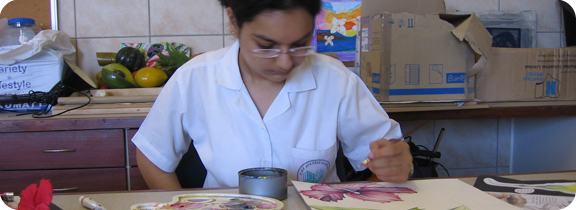
International Baccalaureate
The International Baccalaureate (IB) is a non-profit educational foundation, motivated by its mission to create a better world through education. IB programmes for students aged 3-19 help develop their intellectual, personal, emotional and social skills to live, learn and work in a rapidly globalising world.
Following in the footsteps of its sister schools in Mombasa, Hyderabad and Maputo, the Aga Khan Academy Dhaka plans to become an IB World School, subject to the necessary authorisations.
IB World Schools share a common philosophy – a commitment to improve the teaching and learning of a diverse and inclusive community of students by delivering challenging, high-quality programmes of international education that share a powerful vision.
Aims of the IB programme
Founded in 1968, the International Baccalaureate currently works with schools in 144 countries to develop and offer their programmes to over one million students.
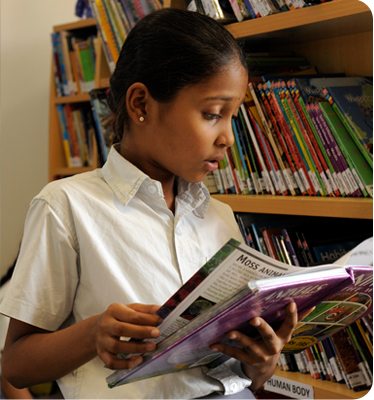 The IB mission statement declares:
The IB mission statement declares:
"The International Baccalaureate aims to develop inquiring, knowledgeable and caring young people who help to create a better and more peaceful world through intercultural understanding and respect. To this end the organisation works with schools, governments and international organisations to develop challenging programmes of international education and rigorous assessment. These programmes encourage students across the world to become active, compassionate and lifelong learners who understand that other people, with their differences, can also be right."
For further information about the International Baccalaureate and its programmes, please visit the IB website.
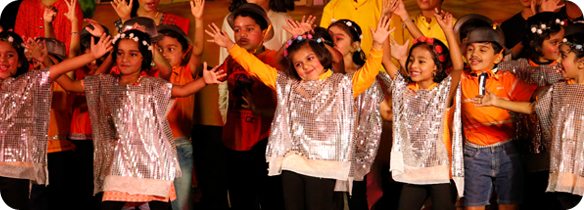
Primary Years Programme
The Aga Khan Academy Dhaka is an International Baccalaureate World School and has been authorised for the Primary Years Programme (PYP).
Foundations for lifelong learning
Our PYP curriculum for students in Grades 1-5 (aged 6-11) focuses on the development of the whole child. It is geared towards creating independent, confident and respectful learners.
Our classroom curriculum addresses the children's social, physical, cultural and ethical development while giving them a strong foundation in all the major areas of knowledge.
The curriculum consists of five essential elements:
- Concepts;
- Knowledge;
- Skills;
- Attitude; and
- Action.
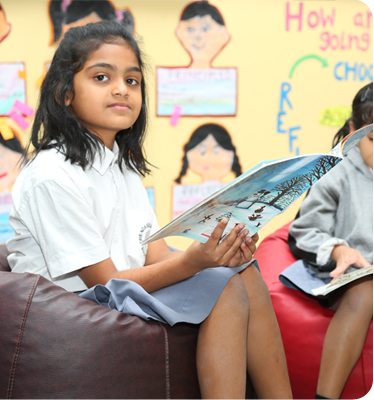 The core subjects we cover include English language, Bangla, mathematics, social studies, science and technology. Our programme also includes physical education, music and art. The use of Informational technology (IT) is integrated throughout the curriculum.
The core subjects we cover include English language, Bangla, mathematics, social studies, science and technology. Our programme also includes physical education, music and art. The use of Informational technology (IT) is integrated throughout the curriculum.
Students and teachers explore questions in all subject areas using an interactive, student-centred approach. This triggers students' curiosity, encouraging them to make connections with real-world issues. Students become active, autonomous learners who can take action as a result of their learning.
Our curriculum develops well-rounded students who are well-versed in all areas of knowledge. They learn to be intellectually curious, principled, caring, open-minded, well-balanced and reflective learners.
Please visit the Admission Requirements page to find out more about applying to Grades 1-5 at the Academy.
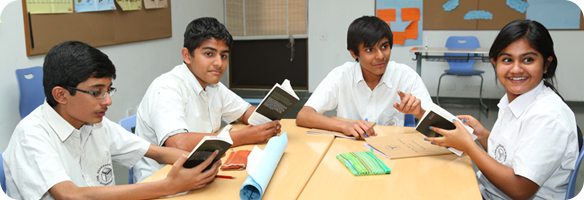
Middle Years Programme
The Aga Khan Academy Dhaka is an authorised International Baccalaureate (IB) World School offering the Middle Years Programme (MYP).Our MYP curriculum for students in Grades 6-10 is part of an integrated curriculum that forms a continuum from the Primary Years Programme (Grades 1-5) to the Diploma Programme (Grades 11-12).
Students study a broad and balanced range of disciplines, including:
- Languages;
- Literature;
- Sciences;
- Social sciences;
- Mathematics;
- Ats;
- Technology; and
- Physical education.
The five Aga Khan Curricular Strands, which are unique to the Aga Khan Academies, are integrated throughout the curriculum.
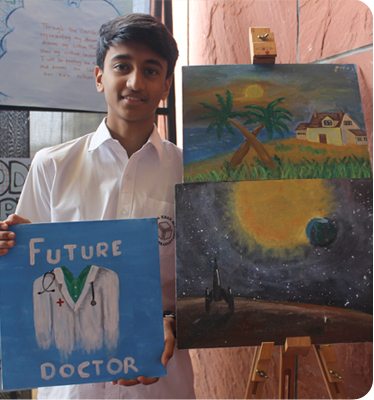 Learning in the middle years
Learning in the middle years
Our MYP students are immersed in a challenging and enriching educational environment. We ensure they master basic skills, develop the ability to analyse and think critically and become computer literate. We also emphasise the development of self-discipline and good work habits.
The programme encourages students to reflect on their learning and make connections with real-world issues. It also helps students develop an awareness of their thought processes and learning strategies, and of how they learn best.
The curriculum includes a service component that makes students aware of community and global needs. We also ensure that each student has a strong leadership experience and receives grounding in ethics, which helps prepare them for future leadership roles.
For further information about applying to Grades 6-10 at the Academy, please see the admission requirements.
